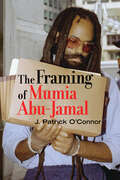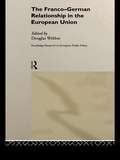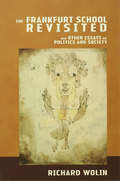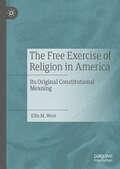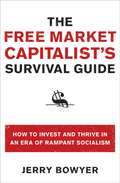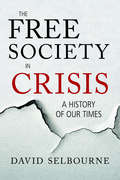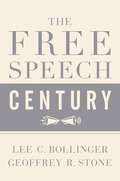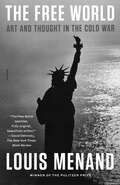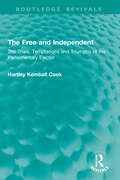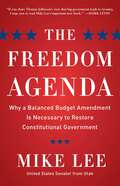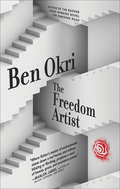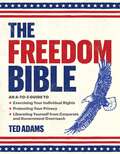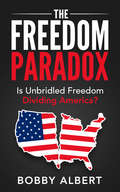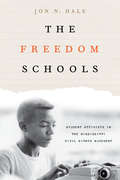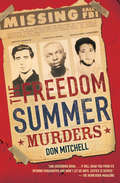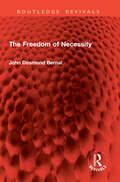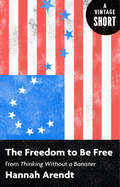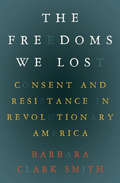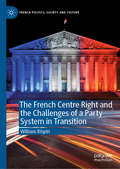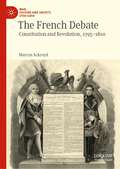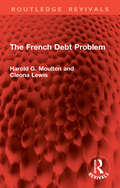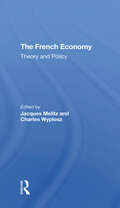- Table View
- List View
The Framing of Mumia Abu-Jamal
by J. Patrick O'ConnorMumia Abu-Jamal--the most famous death-row inmate in the United States--was sentenced to death in 1982 for allegedly killing police officer Daniel Faulkner. Using the preponderance of evidence to establish that Faulkner shot Abu-Jamal as he approached him and that a passenger in Abu-Jamal's brother's car, Kenneth Freeman, then killed Faulkner, this study convincingly shows how the Philadelphia Police Department and District Attorney's Office framed Abu-Jamal for Faulkner's killing. In addition, unlike any other book or article on this subject, it describes the overarching role in the case that then-mayor Frank Rizzo and a small, radical, back-to-nature cult called MOVE played.
The Franco-German Relationship in the EU (Routledge Research in European Public Policy)
by Douglas WebberThis book examines the Franco-German relationship in the EU in relation to different policy sectors. It assesses the nature and importance of the relationship for the policy process.
The Frankfurt School Revisited: And Other Essays On Politics And Society
by Richard WolinThis volume is a collection of essays by Richard Wolin, a leading political theorist and intellectual historian. It is the follow up to Wolin’s two recent, widely acclaimed books: Heidegger’s Children and The Seduction of Unreason. In those books, he explored the legacy of Martin Heidegger and his impact on some of his most influential and notable students. He dealt particularly with the effect that Heidegger’s subsequent embrace of fascism and National Socialism had on these students. Delving further in his next book, Wolin explored the question of why philosophers and intellectuals have been drawn to antiliberal, antidemocratic fascism. The essays in this book are focused on European Political Thought particularly with figures associated with the Frankfurt School. The collection represents a virtual who’s who of European political thinkers with essays on Walter Benjamin, Adorno, Marcuse, Arendt, Heidegger, Weber, Jaspers, and Carl Schmitt. Moving beyond these thinkers and those books, this collection will also include essays on contemporary political issues such as post-communist revolutions, human rights, global democracy, the revival of republicanism, and religion and public life.
The Free Animal
by Lee MacleanFree will is a key but contested concept in the work of Jean-Jacques Rousseau: while the famed philosopher is known to have asserted that free will distinguishes human beings from animals, several interpreters have argued that he merely pretends to have this belief for the sake of healthy politics and to avoid persecution by religious authorities. Through careful readings of key texts and letters, The Free Animal offers a new and original exploration of Rousseau's views on free will.Lee MacLean shows that Rousseau needs and uses the idea of human consciousness of free will to explain the development of morality, convention, and vice. MacLean bases her argument on a broad range of texts, from canonical works to Rousseau's untranslated letters and drafts. Featuring careful analyses and an extensive engagement with the secondary literature, The Free Animal offers a novel interpretation of the changing nature and complexity of Rousseau's intention.
The Free Exercise of Religion in America: Its Original Constitutional Meaning
by Ellis M. WestThis book explains the original meaning of the two religion clauses of the First Amendment: “Congress shall make no law [1] respecting an establishment of religion or [2] prohibiting the free exercise thereof.” As the book shows, both clauses were intended to protect the free exercise of religion or religious freedom. West shows the position taken by early Americans on four issues: (1) the general meaning of the “free exercise of religion,” including whether it is different from the meaning of “no establishment of religion”; (2) whether the free exercise of religion may be intentionally and directly limited, and if so, under what circumstances; (3) whether laws regulating temporal matters that also have a religious sanction violate the free exercise of religion; and (4) whether the free exercise of religion gives persons a right to be exempt from obeying valid civil laws that unintentionally and indirectly make it difficult or impossible to practice their religion in some way. A definitive work on the subject and a major contribution to the field of constitutional law and history, this volume is key to a better understanding of the ongoing constitutional adjudication based on the religion clauses of the First Amendment.
The Free Market Capitalist's Survival Guide
by Jerry BowyerAmerica is hurtling toward socialism. What should free market capitalists do with their money? Barack Obama is aggressively pushing the American economy toward socialism. Maybe he will succeed, maybe he won't. In the meantime, what should the rest of us do with our money? In this unique and timely book, financial adviser Jerry Bowyer combines critical analysis of Obama's economic policies with sound investment guidelines for free market capitalists. Under Obama, taxes will rise, energy will become more expensive, regulation will increase, corporate stocks will suffer, credit will remain tight, and national markets will stagnate. Bowyer explains why this is happening and offers helpful advice on how to profit under the new antigrowth regime-for as long as it lasts.
The Free Society in Crisis: A History of Our Times
by David SelbourneCritiquing assumptions on both the left and the right, noted historian of ideas and political theorist David Selbourne stresses the importance of shared community and civic duty.How stable are free societies today? This book argues that they are under threat from "market free-choice" and "moral free-choice," two sides of the same coin which between them, the author warns, threaten to tear civil society apart. Market free-choice is the prevailing economic ideology that gives free reign to market forces, even when they ride roughshod over communities and whole nations. Moral free-choice, the other side of the coin, is the notion of individual rights without any sense of civic responsibility. The result of such ultra-individualism in economic and moral practice is the malaise we find ourselves in today: a lost sense of place, community, and belonging, as well as dismissiveness and unawareness of the lessons of the past. In the wake of these destructive trends, this book reminds us that personal well-being is dependent in large part upon the maintenance of a coherent civic and moral order. A society consisting of isolated individuals focused solely on personal rights with no regard for the foundation of their freedoms will soon see that foundation crumble through neglect. By the same token, a society that routinely sacrifices equality of opportunity and economic fairness to the forces of the global marketplace creates dangerous tensions between the few haves and the many have-nots. Reminding the reader of the aspirations and largely-forgotten writings of America's founding fathers, the book concludes by pointing to the principles of what the author calls the "true commonwealth" as an alternative to today's political, ethical, and social disorders.
The Free Speech Century
by Geoffrey R. Stone Lee C. BollingerIn The Free Speech Century, two of America's leading First Amendment scholars, Lee C. Bollinger and Geoffrey R. Stone, have gathered a group of the nation's leading constitutional scholars--Cass Sunstein, Lawrence Lessig, Laurence Tribe, Kathleen Sullivan, Catherine McKinnon, among others--to evaluate the evolution of free speech doctrine since Schenk and to assess where it might be headed in the future.
The Free World: Art and Thought in the Cold War
by Louis Menand"An engrossing and impossibly wide-ranging project . . . In The Free World, every seat is a good one." —Carlos Lozada, The Washington Post"The Free World sparkles. Fully original, beautifully written . . . One hopes Menand has a sequel in mind. The bar is set very high." —David Oshinsky, The New York Times Book ReviewNamed a most anticipated book of April by The New York Times | The Washington Post | Oprah DailyIn his follow-up to the Pulitzer Prize–winning The Metaphysical Club, Louis Menand offers a new intellectual and cultural history of the postwar yearsThe Cold War was not just a contest of power. It was also about ideas, in the broadest sense—economic and political, artistic and personal. In The Free World, the acclaimed Pulitzer Prize–winning scholar and critic Louis Menand tells the story of American culture in the pivotal years from the end of World War II to Vietnam and shows how changing economic, technological, and social forces put their mark on creations of the mind. How did elitism and an anti-totalitarian skepticism of passion and ideology give way to a new sensibility defined by freewheeling experimentation and loving the Beatles? How was the ideal of “freedom” applied to causes that ranged from anti-communism and civil rights to radical acts of self-creation via art and even crime? With the wit and insight familiar to readers of The Metaphysical Club and his New Yorker essays, Menand takes us inside Hannah Arendt’s Manhattan, the Paris of Jean-Paul Sartre and Simone de Beauvoir, Merce Cunningham and John Cage’s residencies at North Carolina’s Black Mountain College, and the Memphis studio where Sam Phillips and Elvis Presley created a new music for the American teenager. He examines the post war vogue for French existentialism, structuralism and post-structuralism, the rise of abstract expressionism and pop art, Allen Ginsberg’s friendship with Lionel Trilling, James Baldwin’s transformation into a Civil Right spokesman, Susan Sontag’s challenges to the New York Intellectuals, the defeat of obscenity laws, and the rise of the New Hollywood. Stressing the rich flow of ideas across the Atlantic, he also shows how Europeans played a vital role in promoting and influencing American art and entertainment. By the end of the Vietnam era, the American government had lost the moral prestige it enjoyed at the end of the Second World War, but America’s once-despised culture had become respected and adored. With unprecedented verve and range, this book explains how that happened.
The Free and Independent: The Trials, Temptations and Triumphs of the Parliamentary Elector (Routledge Revivals)
by Hartley Kemball CookThe Free and Independent (1949) looks at Parliament from the point of view of the Elector rather than the Elected. After dealing with the early history of elections when the franchise was sometimes considered to be a nuisance rather than a privilege, it traces the recognition of the value of the franchise primarily because it secured certain advantages for towns and districts, but also because it was discovered that a vote could be sold often at a high price. It then considers the long struggle for reform and looks at the Crown and the elector, bribery and corruption, and female electors.
The Freedom Agenda: Why a Balanced Budget Amendment is Necessary to Restore Constitutional Government (Playaway Adult Nonfiction Ser.)
by Mike LeeWe hear it everyday: government spending is out of control. Yet, despite all the rhetoric coming out of Washington about the need to cut spending, we continue to go deeper and deeper into debt. If we're serious about restoring America to fiscal health, we must do something about government spending, not just talk about it. So argues U.S. Senator Mike Lee in his new book, The Freedom Agenda. Revealing how the federal government went from a limited constitutional government to the colossal spending machine it is today, The Freedom Agenda clearly explains:the one Supreme Court case that led to the federal government's massive overreachthe need for a balanced-budget amendment to repair the government's broken fiscal policiesthe reason returning power to the states should appeal to both conservatives and liberalsthe simple steps we can--and must--take to slash federal spending and the federal government's intrusion into our daily livesTimely and powerful, The Freedom Agenda shows how to put the federal government back in its proper place, and why a balanced budget amendment is the key to reigning in spending and the federal government's abuse of power.
The Freedom Artist
by Ben OkriAn NPR Best Book of 2020: “Okri’s tale is especially resonant in our current post-truth environment.” —Booklist (starred review)In a world uncomfortably like our own, a young woman called Amalantis is arrested for asking a question. Her question is this: Who is the Prisoner?When Amalantis disappears, her lover Karnak goes looking for her. He searches desperately at first, then with a growing realization that to find Amalantis, he must first understand the meaning of her question.Karnak’s search leads him into a terrifying world of deception, oppression, and fear at the heart of which lies the prison. Then Karnak discovers that he is not the only one looking for the truth.The Freedom Artist is an impassioned plea for justice and a penetrating examination of how freedom is threatened in a post-truth society. In Ben Okri's most significant novel since the Booker Prize–winning The Famished Road, he delivers a powerful and haunting call to arms.“With the stark power of myth, this political allegory evolves into an argument for artistic freedom.” —The New York Times Book Review“[With] prophetic warnings of apocalypse akin to Octavia Butler’s The Parable of the Sower, The Freedom Artist offers a contemplative look at post-truth society.” —Sierra Magazine“The concise, declarative prose and the parable-like architecture of the stories resemble ancient forms of wisdom literature.” —The Wall Street Journal“Combines fable, folklore, and mythology with moments of surreal horror to produce a rallying cry against the oppressive institutions that would seek to make knowledge illegal.” —Locus Magazine
The Freedom Bible: An A-to-Z Guide to Exercising Your Individual Rights, Protecting Your Privacy, Liberating Yourself from Corporate and Government Overreach
by Ted AdamsLearn How to Protect Your Family&’s Freedom!Freedom is the foundation on which America was born and continues to thrive. If you believe in the strength of freedom as more than an ideal, you can find smart ways to exercise it in all parts of your life! The Freedom Bible is your A-to-Z guide to knowing your individual rights and seeking more control and freedom through the decisions you face every day.Own healthcare decisions for you and your familyMake choices that direct your dollars where you want—for example, made in America, not overseasKnow your options to challenge governing boards—from home ownership associations to school boardsReduce your reliance on &“the grid&”Escape the invasiveness of all kinds of technologyGuard your privacy and free speech on social mediaAnd much more!Get freedom from…· Big Government· Big Tech· Dependence on Overseas Goods· Employer &“Requirements&”· HOAs· Social media jail· Spam callers· Taxes· And More!
The Freedom Paradox: Is Unbridled Freedom Dividing America?
by Bobby AlbertCutting through the haze of hatred and polarizing politics of our time, The Freedom Paradox offers an unexpected solution to re-unite America. It was the best of times, and it now seems like the worst of times. The chaos, discord and hostility gripping America today are evident to all. The root cause of these woes, however, is not so obvious. Using his keen sense of cultural awareness, Bobby Albert answers the questions that are on our hearts and minds, “What happened to the America of our youth?” and “How can we re-claim it?”. Many are fighting for and celebrating their freedoms, but few realize that unrestrained freedom today results in chaos and constraints tomorrow. Within The Freedom Paradox, readers discover:The “Life and Liberty Equation” and why it’s out of balanceThe competing approaches of principle and expediency The contrasts and consequences associated with scarcity and abundance mindsets The impact of what they say and how they say it The root cause of the problems of their great nation and how they can help
The Freedom Riders (Cornerstones of Freedom)
by Deborah KentThe "Cornerstones of Freedom" books detail important events in United States history. In this book, the civil rights movement during the 20th century is explored with regard to race relations in the Southern states.
The Freedom Schools: Student Activists in the Mississippi Civil Rights Movement (Margaret Walker Alexander Series In African American Studies)
by Jon HaleCreated in 1964 as part of the Mississippi Freedom Summer, the Mississippi Freedom Schools were launched by educators and activists to provide an alternative education for African American students that would facilitate student activism and participatory democracy. The schools, as Jon N. Hale demonstrates, had a crucial role in the civil rights movement and a major impact on the development of progressive education throughout the nation. Designed and run by African American and white educators and activists, the Freedom Schools counteracted segregationist policies that inhibited opportunities for black youth. Providing high-quality, progressive education that addressed issues of social justice, the schools prepared African American students to fight for freedom on all fronts. Forming a political network, the Freedom Schools taught students how, when, and where to engage politically, shaping activists who trained others to challenge inequality. Based on dozens of first-time interviews with former Freedom School students and teachers and on rich archival materials, this remarkable social history of the Mississippi Freedom Schools is told from the perspective of those frequently left out of civil rights narratives that focus on national leadership or college protestors. Hale reveals the role that school-age students played in the civil rights movement and the crucial contribution made by grassroots activists on the local level. He also examines the challenges confronted by Freedom School activists and teachers, such as intimidation by racist Mississippians and race relations between blacks and whites within the schools. In tracing the stories of Freedom School students into adulthood, this book reveals the ways in which these individuals turned training into decades of activism. Former students and teachers speak eloquently about the principles that informed their practice and the influence that the Freedom School curriculum has had on education. They also offer key strategies for further integrating the American school system and politically engaging today's youth.
The Freedom Summer Murders
by Don MitchellA gripping true story of murder and the fight for civil rights and social justice in 1960s Mississppi.On June 21, 1964, three young men were killed by the Ku Klux Klan for trying to help black Americans vote as part of the 1964 Fredom Summer registration effort in Mississippi. The disappearance and brutal murders of James Chaney, Andrew Goodman, and Michael Schwerner caused a national uproar and was one of the most significant events of the civil rights movement.The Freedom Summer Murders tells the tragic story of these brave men, the crime that resulted in their untimely deaths, and the relentless forty-one-year pursuit of a conviction. It is the story of idealistic and courageous young people who wanted to change their county for the better. It is the story of black and white. And ultimately, it is the story of our nation's endless struggle to close the gap between what is and what should be.
The Freedom of Necessity (Routledge Revivals)
by John Desmond BernalFirst published in 1949, The Freedom of Necessity explores various aspects of the transformation of human society in the mid-20th century. It deals with themes like man and the world; relevance of science; science and the humanities; science and the arts; organised research for peace; science in economics and politics; the atomic age; Engels and science; Engels’ dialectics of nature; and a century of Marxism. This is an important historical reference verb for students of political philosophy, political theory and philosophy.
The Freedom to Be Free: From Thinking Without a Banister (A Vintage Short)
by Hannah ArendtThis lecture is a brilliant encapsulation of Arendt’s widely influential arguments on revolution, and why the American Revolution—unlike all those preceding it—was uniquely able to install political freedom. “The Freedom to be Free” was first published in Thinking Without a Banister, a varied collection of Arendt’s essays, lectures, reviews, interviews, speeches, and editorials—which, taken together, manifest the relentless activity of her mind and character and contain within them the articulations of wide and sophisticated range of her political thought. A Vintage Shorts Selection. An ebook short.
The Freedoms We Lost: Consent and Resistance in Revolutionary America
by Barbara Clark SmithA brilliant and original examination of American freedom as it existed before the Revolution, from the Smithsonian&’s curator of social history. The American Revolution is widely understood—by schoolchildren and citizens alike—as having ushered in &“freedom&” as we know it, a freedom that places voting at the center of American democracy. In a sharp break from this view, historian Barbara Clark Smith charts the largely unknown territory of the unique freedoms enjoyed by colonial American subjects of the British king—that is, American freedom before the Revolution. The Freedoms We Lost recovers a world of common people regularly serving on juries, joining crowds that enforced (or opposed) the king&’s edicts, and supplying community enforcement of laws in an era when there were no professional police. The Freedoms We Lost challenges the unquestioned assumption that the American patriots simply introduced freedom where the king had once reigned. Rather, Smith shows that they relied on colonial-era traditions of political participation to drive the Revolution forward—and eventually, betrayed these same traditions as leading patriots gravitated toward &“monied men&” and elites who would limit the role of common men in the new democracy. By the end of the 1780s, she shows, Americans discovered that forms of participation once proper to subjects of Britain were inappropriate—even impermissible—to citizens of the United States. In a narrative that counters nearly every textbook account of America&’s founding era, The Freedoms We Lost challenges us to think about what it means to be free.
The French Centre Right and the Challenges of a Party System in Transition (French Politics, Society and Culture)
by William RispinThis book argues that the defeat of the main French Centre Right party in the 2017 presidential and legislative elections, and its subsequent disintegration, were the result of a failure to respond effectively to the challenges posed by a continuing realignment of the party system. By the start of the Hollande presidency, many sections of the electorate had lost faith in the traditional parties of government and the ideologies which they represented and were adopting a more individualist approach to politics. The Left/Right divide, which had determined relations between parties since the creation of the Fifth Republic in 1958, gave way to a new arrangement, based on three axes – identity, liberal economics and Europe. These policy areas would provoke major differences of opinion among supporters of the Centre Right, and lead a significant number of them to abandon Les Républicains, which was a major factor in the election of Emmanuel Macron.
The French Connection: The World's Most Crucial Narcotics Investigation
by Robin MooreA STATEMENT BY ROBIN MOORE, AUTHOR OF THE FRENCH CONNECTION: "The account that follows is a case history of what must qualify as one of the finest police investigations in the annals of United States law enforcement. Almost certainly it represents the most crucial single victory to date in the ceaseless, frustrating war against the import of vicious narcotics into our country."
The French Debate: Constitution and Revolution, 1795–1800 (War, Culture and Society, 1750 –1850)
by Marcus AckroydThis book explores the creation and career of the French Constitution of 1795, operative from the start of the Directory until Napoleon’s takeover in 1799. It explores the composition, history and replacement of the French Revolution’s third Constitution through a focus on the speeches and writings of four sets of political voices discernible in late 1790s France. The four main chapters present these voices as Thermidorians, Conservatives, Republicans and Brumairiens. They reveal the intensity and breadth of the debates generated by the permanent tension between the Constitution and the many ongoing conflicts of the Revolution. Set within and beyond the government and the two legislative chambers, the debates feature numerous conflicts central to the French Revolution including the composition and functions of the public powers, the legitimacy of exceptional laws, the regulation of the press and freedom of religion. This sustained focus on the relationship between the political nation and the Constitution provides a fresh reading of the political culture of the Directory.
The French Debt Problem (Routledge Revivals)
by Cleona Lewis Harold G. MoultonOriginally published in 1925, this volume was written at a time when the cost of living was rising in France and the currency of the Franc was declining. Uneasiness over possible national bankruptcy or financial disintegration was increasing. The book reveals the true financial situation in France and outlines a plan for the restoration of sound financial and economic conditions. As well as discussing the economy of post-World War I France the book also touches on the social and political problems of the time.
The French Economy: Theory And Policy
by Charles Wyplosz Jacques MelitzThis volume brings together the proceedings of a conference held at the Institut Europeen d' Administration des Affaires (INSEAD) at Fontainebleau on July 5, 6, and 7, 1982. Summer conferences abound in the Paris region. That it was possible to attract an imposing international cast of economists within walking distance of the historic castle of Fontainebleau and one hour away from central Paris by car during the month of July is nothing especially surprising. But in this case there was a particular motivation for choosing the French site.
